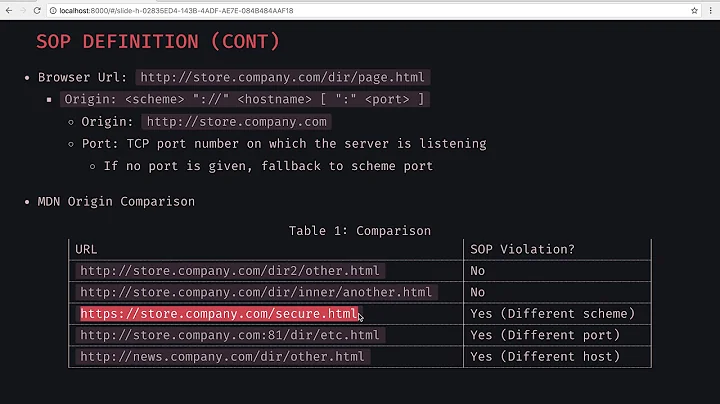Cross site scripting attacks and same origin policy
Solution 1
Typically no.
A non-persistant or reflected XSS attack exploits input that is echoed back as page content without proper sanitization, without persisting it. The injected script will seem to come from the exploited domain in both cases.
For example if you do this in PHP: echo $_GET['param'] and send a link to the page to somebody containing
?param=<script>alert('got you!');</script>
it is a non-persistant XSS attack, and same-origin policy has nothing to do with it.
Same-origin means that you cannot directly inject scripts or modify the DOM on other domains: that's why you need to find an XSS vulnerability to begin with.
Solution 2
SOP typically cannot prevent either XSS or CSRF.
For XSS, jakber's answer already provides a good explanation. I just want to add that the reason to call this vulnerability "cross-site" is because the attacker can inject code (e.g. <script src="...">) into the target page that loads malicious javascript from another website, which is typically controlled by the attacker. Loading Javascript from another website is not denied by SOP, because doing that will break the Web.
For CSRF, SOP cannot prevent it for most cases because SOP does not prevent website A to send GET and POST requests to website B.
Related videos on Youtube
Comments
-
Methos almost 2 years
I am familiar with the persistent and non-persistent XSS. I also know about Same origin policy that prevents/restricts requests originating from one websites page to go to another websites servers. This made me think that the same origin policy can stop at least the non-persistent type of XSS attacks (Because in the persistent type of attack the malicious code origin would be same as the private information that is stolen). Is my understanding correct? Can SOP be used to stop/reduce these attacks?
EDIT: Okay I was confusing between invoking methods between 2 scripts at the browser side and invoking methods such as HTTP POST on another website. Thank you for the answer jakber.
Now I have another question, wouldn't SOP be able to prevent Cross-site request forgery? The example given in the wikipedia talks about Bob accessing a malicious image tag created by Mallory on the chat forum. However, as per the SOP rule, the malicious script should not be able to access bank's cookie. Am I missing something here?
-
Methos over 12 yearsThanks for the answer. Do you have any comments about my new edits?
-
jakber over 12 yearsSOP doesn't apply to the src of images, style, iframe and script elements, nor to the target of forms for example. It does however apply to XmlHttpRequest, so it prevents this particular attack vector for CSRF. See also owasp.org/index.php/…
-
 Magnus almost 6 yearsIf I understand correctly, SOP does prevent GET. That is indeed the whole point of SOP, to prevent a script silently using an authenticated browser (authenticated with a cookie) from reading files from other pages (as such sources might be confidential if the browser is already authenticated). POST on the other hand, is allowed.
Magnus almost 6 yearsIf I understand correctly, SOP does prevent GET. That is indeed the whole point of SOP, to prevent a script silently using an authenticated browser (authenticated with a cookie) from reading files from other pages (as such sources might be confidential if the browser is already authenticated). POST on the other hand, is allowed. -
Steve about 5 years@Magnus According to Mozilla, webpages can embed JavaScript from other origins.






